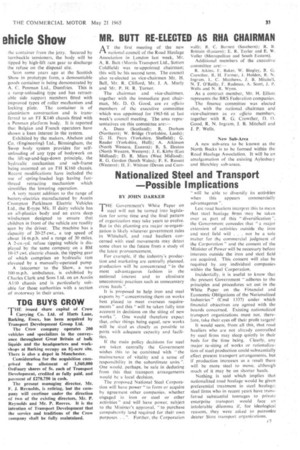Nationalized Steel and Transport Possible Implications
Page 35

If you've noticed an error in this article please click here to report it so we can fix it.
BY JOHN DARKER
THE Government's White Paper on steel will not be turned into legislation for some time and the final pattern of organization may take years to evolve. But in this planning era major re-organization is likely whatever government rules in Whitehall, and road hauliers concerned with steel movements may detect some clues to the future from a study of the latest pronouncement.
For example, if the industry's production and marketing are centrally planned, production will he concentrated "in the most advantageous fashion in the national interest and to eliminate uneconomic practices such as unnecessary cross hauls ".
It is proposed to help iron and steel exports by " concentrating them on works best placed to meet overseas requirements" and this will be taken fully into account in decisions on the siting of new works ". One would therefore expect that, other things being equal, new works will be sited as closely as possible to ports with adequate capacity and facilities.
If the main policy decisions for steel are taken centrally the Government wishes this to be combined with the maintenance of vitality and a sense of responsibility in the subordinate units ". One would, perhaps, be safe in deducing from this that transport arrangements would be a local decision.
The proposed National Steel Corporation will have power "to form or acquire by agreement other companies, whether engaged in iron or steel or other activities" and will have power, subject to the Minister's approVal. to purchase compulsorily land required for their own purposes. . .". Further. the Corporation " will he able to diversify its activities when this appears commercially advantageous ".
Lest road hauliers interpret this to mean that steel haulage firms may be taken over as part of this "diversification the Government concedes that "a major extension of activities outside the iron and steel field will • . . not he a sole matter for the commercial judgment of the Corporation and the consent of the Minister of Power will be necessary before interests outside the iron and steel field are acquired. This consent will also be required by any individual companies within the Steel Corporation.
Incidentally, it is useful to know that the present Government "adheres to the principles and procedures set out in the White Paper on the Financial and Economic Obligations of the Nationalized Industries" (Cmd 1337) under which financial objectives are agreed with the hoards concerned. Existing nationalized transport organizations must not, therefore, take their eyes off their profit targets!
It would seem, from all this, that road hauliers who are not already controlled by steel firms may sleep ,:ittietly in their beds for the time being. Clearly, any major re-siting of works or rationalization of steel production could substantially effect present transport arrangements, but if production increases as a result there will be more steel to move, although much of it may be on shorter hauls.
Nothing is said which implies that nationalized road haulage would be given preferential treatment in steel, haulage: steel firms who in recent years have transferred subStantial tonnages to private enterprise transport would face an intolerable dilemina if, for ideological reasons, they were asked to patronize dearer State transport organizations.
























































































































